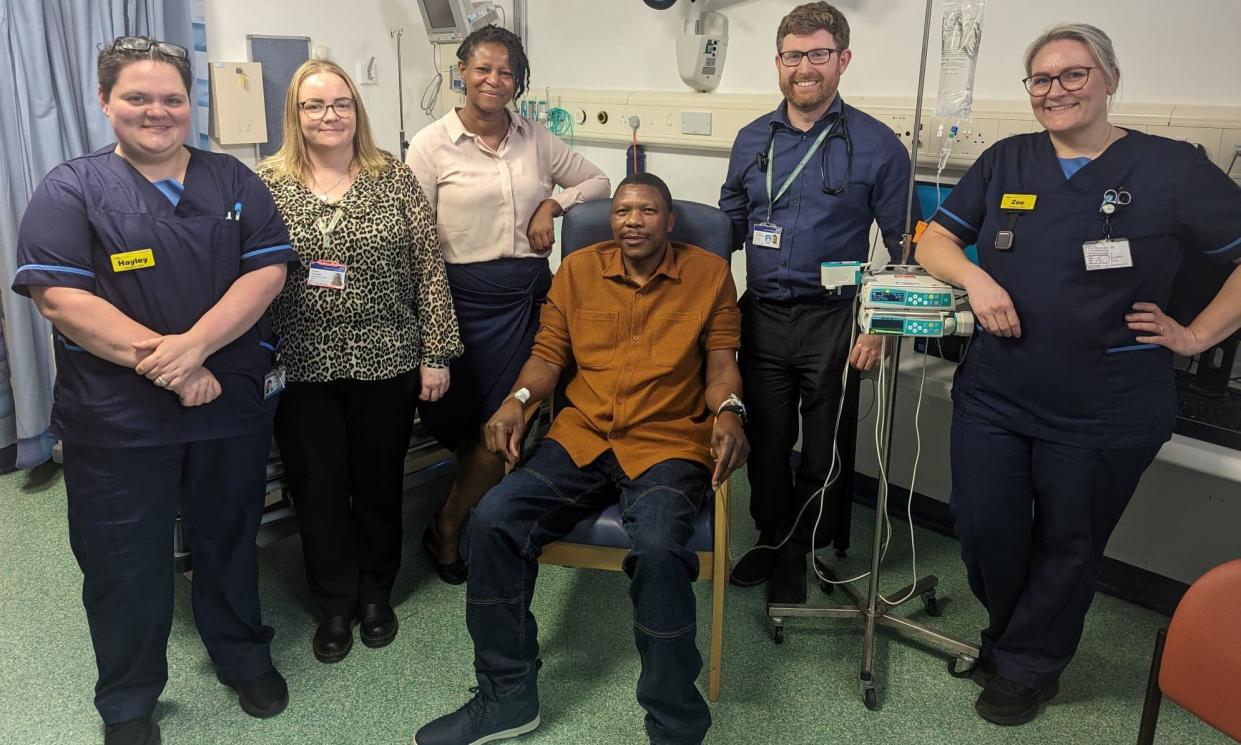NHS patients in England to be offered trials for world-first cancer vaccine

Thousands of patients in England are to be fast-tracked into groundbreaking trials of personalised cancer vaccines in a revolutionary world-first NHS “matchmaking” scheme to save lives.
The gamechanging jabs, which aim to provide a permanent cure, are custom-built for each patient in just a few weeks. They are tailored to the individual’s tumours and work by telling their body to hunt and kill any cancer cells and prevent the disease from coming back.
Under the new scheme, the first of its kind in the world, patients who meet the eligibility criteria and agree to have a blood test and sample of their cancer tissue analysed will gain immediate access to clinical trials for the new vaccines that experts say represent a new dawn of treatments for cancer.
The head of NHS England, Amanda Pritchard, hailed the development as a “landmark moment” for patients. “The NHS is in a unique position to deliver this kind of world-leading research at size and scale,” she said.
Research into cancer vaccines is at an early stage, but trials have already shown they can be effective at killing off any remaining tumour cells after surgery and dramatically cut the risk of cancer returning.
The NHS has enrolled dozens of patients on to its scheme, the Cancer Vaccine Launch Pad, with thousands more to be enlisted at 30 NHS sites across England. The first trials are expected to focus on colorectal, skin, lung, bladder, pancreatic and kidney cancer, officials said, but other forms of the disease could be added in future.
“As more of these trials get up and running at hospitals across the country, our national matchmaking service will ensure as many eligible patients as possible get the opportunity to access them,” Pritchard said.
Details of the scheme were revealed on the eve of the world’s largest cancer conference, the annual meeting of the American Society of Clinical Oncology (Asco) in Chicago, where tens of thousands of oncologists, health researchers and scientists will convene this weekend.
The German biotech company BioNTech, one of the companies partnering with the NHS on the trials, will present new preliminary data at the Asco conference tomorrow on how measuring circulating tumour DNA could help increase early detection of colorectal cancer.
Iain Foulkes, the executive director of research and innovation at Cancer Research UK, said it was “incredibly exciting” that patients were accessing personalised jabs in a development that will be a “gamechanger” in the fight against cancer. “Clinical trials like this are vital in helping more people live longer, better lives, free from the fear of cancer,” he said.
The first NHS patient to join the Cancer Vaccine Launch Pad is Elliot Pfebve. The 55-year-old lecturer at Coventry University had no symptoms and was diagnosed with colorectal cancer after a routine health check with his GP. He had surgery to remove his tumour and 30cm of his large intestine, followed by chemotherapy.
Pfebve then received his personalised cancer vaccine at University Hospitals Birmingham NHS foundation trust, one of several sites taking part in the BioNTech colorectal cancer vaccine trial. It was designed with the same mRNA technology used to create the Pfizer/BioNTech Covid vaccine.
“Through the potential of this trial, if it is successful, it may help thousands, if not millions of people, so they can have hope,” Pfebve said. “I hope this will help other people.”
His vaccine was created by analysing his tumour to identify mutations specific to his cancer. Doctors then used this data to create a personalised cancer vaccine.
“Being part of this trial has been a really important decision in my life, both for me and my family,” said Pfebve. “Having been through the difficulty of diagnosis and debilitating chemotherapy, it felt wonderful to be able to take part in something which could lead to a new way of treating cancer, and if others can benefit from what the trial might discover, then that’s great, too.”
The trial’s principal investigator, Dr Victoria Kunene, said it was too early to say if Pfebve had been cured completely, but said she was “extremely hopeful”.
“Based on the limited data we currently have of the in-body response to the vaccine, this could prove to be a significant and positive development for patients, but more data is yet needed and we continue to recruit suitable patients to the trial to establish this further.”
Cancer vaccines are designed to induce an immune response that may prevent cancer from returning after surgery to remove tumours, by stimulating a patient’s immune system to recognise and destroy any remaining cancer cells – and stop them coming back.
“Seeing Elliot receive his first treatment as part of the Cancer Vaccine Launch Pad is a landmark moment for patients and the health service as we seek to develop better and more effective ways to stop this disease,” Pritchard said.
Last month the Guardian reported how doctors had begun trialling the world’s first personalised mRNA cancer vaccine for melanoma, as experts hailed its “gamechanging” potential to permanently cure cancer.
Prof Peter Johnson, NHS England’s national clinical director for cancer, said: “We know that even after a successful operation, cancers can sometimes return because a few cancer cells are left in the body, but using a vaccine to target those remaining cells may be a way to stop this happening.
“Access to clinical trials could provide another option for patients and their families, and I’m delighted that through our national launch pad we will be widening the opportunities to be part of these trials for many more people, with thousands of patients expected to be recruited in the next year.”
NHS officials said vaccines being tested in the trials aimed to help patients with different forms of cancer and, if successfully developed, researched and approved, could become part of standard care.

 Yahoo News
Yahoo News 
